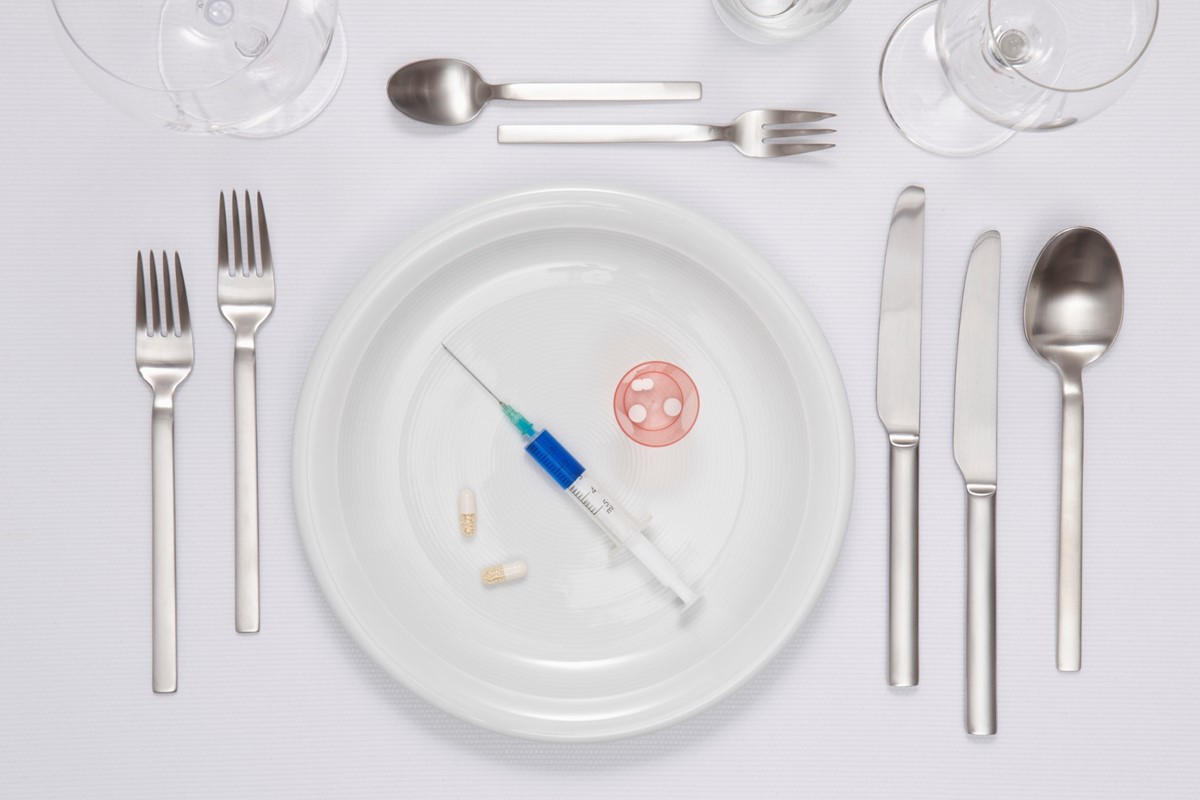Consequently, hosting a lavish banquet or ordering lobster is no longer a sufficient signifier of status; today, a sign of true wealth is the ability to forgo food entirely. Eating essentially betrays a person’s most basic human needs; in an era obsessed with ‘self-optimisation’, not eating suggests that a person is somehow ‘beyond’ needs and has achieved total mastery of their body with a heightened capacity for efficiency and focus.
“There is a history in Judeo-Christian societies – and likely in many other religions, hence the widespread practice of fasting – where demonstrating a lack of need for material things, especially food, and being able to demonstrate self-control and discipline are signs of spiritual transcendence,” Dr Woolhouse says. Famously, Italian saint Catherine of Siena would fast for prolonged periods of time as a means of demonstrating her devotion to God through extreme self-control. “But there’s also a class dimension to this,” Dr Woolhouse continues, “because being able to demonstrate a lack of need for material goods, like food, suggests social transcendence too; it’s symbolic of living a life whereby our material needs aren’t a daily concern.” She adds that “fad diets are very unlikely to take off in societies where there are food shortages or food insecurity.”
It’s still jarring to watch celebrities openly admit to fasting for 23 hours a day or taking 14 different supplement pills in lieu of a balanced breakfast. “It normalises and sanctions practises that in other contexts would be regarded as eating disordered,” Dr Woolhouse says. “When eating practices are packaged as ‘done in the name of health’, they are more socially acceptable and difficult to contest.” She points out that a normal teenage girl restricting her diet in the same way as Johnson would likely be regarded as ill and in need of medical intervention. “What we, as a society, regard as ‘normal’ and ‘abnormal’ eating is contextual and largely rides on how those eating practices are framed.”
It’s obvious but bears reiterating that extreme, fad diet trends are both ineffectual and dangerous. But this trend isn’t really about food or health. It’s about performance. It’s a way for the moneyed classes to signal their wealth and status and posture as above us mere mortals who debase ourselves by eating.
Critical support for the grifters out there starving billionaires by gaslighting them into thinking they don't need food.
I’ve been seeing this trend for a while. Indulgence is seen as pedestrian and weak-willed. I think this is because the religious and capitalist classes have been gradually merging with the slow elimination of proletarian religious leaders via lack of funding.
The truth is that we are beings of this earth, indulge in this creation as you are not superior or transcendent over any of it. Our leaders are afraid of their own mortality and don’t understand the freedom of regulating our desires by embracing and guiding them.
I fast a couple times a month 'cause it makes me feel better and helps keep my weight down. Rich people continue to be weird, but I guess this is another expensive grift thing to demonstrate status.
Same, only I do it once every few months but the fasts are longer. Water fasting for a week+, when I'm not too depressed to make the commitment in the first place, does wonders for depression and anxiety. And weight. And general sense of well-being. There's good reason so many religions incorporate fasting as a spiritual practice. But rich bourgsie fucks will take, twist, and ruin anything cool like that, making it trite and part of their self-absorbed narcissism. Just like the silicon valley techbros did with psychedelics like DMT.
How do you avoid drinking water for a week lol, that kills you
Water fasting is with water. Without water is called dry fasting
She adds that “fad diets are very unlikely to take off in societies where there are food shortages or food insecurity.”
lil bit of foreshadowing for the coming decade
I used to fast regularly and it made me feel great. Turns out I had celiac and my body was just relieved I was taking a break from poisoning it
Im almost certain that all positive benefits people get from fasting and by vast extension dieting and the negative effects of high weight, are all caused by a nutritional environment of constant poisonous microplastic slop. If Lunchables cutting with lead is any indication this theory is very accurate.
You're right that fasting is beneficial in part because it temporarily cuts off the intake all the poisonous shit in a typical diet, but there are all kinds of other very real physiological and evolutionary reasons that people feel better and get health benefits from fasting. It's something that has been well known and commonly reported since long before microplastics and all the other modern poisons we're exposed to. Fasting is one of those things you can find throughout history and in all sorts of different cultures as a remedy and spiritual practice... and has been confirmed by modern medicine.
Another thing to keep in mind is that fasting actually wouldn't help a person feel better with respect to a lot of those poisons which are more of a slow, long-term detriment, where briefly stopping their intake before starting again wouldn't change your immediate experience. Since you mentioned lead, if a person has been getting small amounts of lead over long periods of time, suddenly not getting any lead for a couple days isn't going to make them feel any better in large part because lead gets deposited in the bones and will keep poisoning someone even after they stop consuming it. Lead also causes at least some irreversible neuronal damage, especially to people exposed in childhood which makes it so fucking insidious and evil that our overlords intentionally continue to allow it to be a problem in poor and minority communities. Fasting isn't going to make those lead-poisoned kids or the adults they become suddenly feel less lead-poisoned. But it might make them feel better for other reasons.
To be honest, no offense to you and im sure it works for your body, but im extremely skeptical of fasting as being a universally applicable “booster”.
First of all, it appeals to this trend I’ve noticed that people seem to correlate indulgence with weakness, and abstinence with strength. It coincides with this tendency to believe our desires are naturally problematic, that they need to be repressed rather than listened to as a communication of our body.
Secondly, there have been studies associating this stuff with an increased chance of heart disease. That study was specifically about intermittent fasting, but if someone is already at risk it doesn’t seem like a good idea.
Finally, it’s just not practical for everyone. Lots of people have gut issues or physical disorders that make fasting significantly more painful and impractical than it would be for others. I can’t go too long without eating - my body starts becoming extremely nauseous. I assume this is true for a lot of people and not just me.
Overall I’m sure it works for you but it’s just too much of a “self-help-book” “minimalist”-coded solution for me to see it as a universally good practice.
Long reply incoming.
im extremely skeptical of fasting as being a universally applicable “booster”.
It's not universal, but it is broadly beneficial for most people, especially people with western diets. You can be skeptical of that, but it really is backed up by the science, with very clear physiological mechanisms explaining how and why it's beneficial. Anecdotally, almost everyone who gives it a try will also have positive things to say about it. Normally, I wouldn't really count that anecdotal thing in, but I'm not just talking about people trying new internet trends here, we're talking about something on a scale of (for example) hundreds of millions or more Muslims who do fasting as a spiritual practice and religious observance.
As far as coinciding with the tendencies you mentioned, once again... fasting is not some new fad. It may have gained some mainstream popularity (as it has in the past since fads are often cyclic) and is recently getting discussed in the same rounds along with actual fad diets, but like I mentioned before, fasting is something that almost every major religion has incorporated in some way. You talk about listening to our bodies and the folly of trying to repress our desires but a major, even basic part of listening to our bodies is learning how to balance our desires. I'd agree that there has been a puritanical current especially in American culture that demonizes natural and healthy desires resulting in their repression in deeply unhealthy ways. But that doesn't mean that overindulgence doesn't exist or that it isn't a major problem for a lot of people, or even that there isn't also a precedent for overindulgence on a cultural level as well, given the capitalist emphasis on consumerism. Despite the bourgeois shitheads in the OP article, it's no secret that traditionally the way to show off wealth has been through flaunting excess.
As with most things, there is a healthy balance that needs to be found between short term desires and long term health. I'd hope that isn't a controversial thing to say. The exact location of that balance varies with the individual, but to look at modern western diets along with all the severe health consequences they are known to be responsible for and conclude that the problem is the suppression of desire is just... well, misguided to put it lightly. Like we know the addictive nature of the processed sugars that are pumped into food for the express purpose of getting people to keep eating long after they've had even ten times the amount that would be healthy to have in a day. It isn't a person's fault for having the desire to eat more because it is literally a physiological addiction, that again, has been intentionally manufactured to drive consumption and therefore profits. But the immediate answer for someone suffering from that addiction is absolutely not to give in to the desire and just eat more. No more than the answer for someone with an opiate or alcohol addiction is to just indulge when the desire is felt, but rather to make an attempt to curb the consumption of opiates/alcohol/sugar despite the sometimes overwhelming desire to give into it. Listening to your body is much more about recognizing what it's telling you about its long-term well-being than it is about sating its immediate desires. And for the vast majority of people especially in the west/global north, fasting is a positive way to respond to the malaise their body is screaming at them with. Almost everyone who really tries fasting, including people in this thread, report that they feel much better as a result of doing so. That is listening to your body.
there have been studies associating this stuff with an increased chance of heart disease. That study was specifically about intermittent fasting, but if someone is already at risk it doesn’t seem like a good idea.
I'd take a look at that study then, but with an extremely skeptical eye, considering there have been literally scores of studies saying the exact opposite. Thee major lifestyle element that most strongly predicts longevity is restricted caloric intake. In other words, of all the factors that we have been able to find that correlate with people living longer lives, is people who have taken in fewer calories over their life. This is well known as any quick search can quickly confirm for you. As another obvious example, again, we know through countless studies with overwhelming evidence how bad a high intake of sugar is, how it directly leads to heart disease and of course diabetes. Diabetes (specifically type II), as you may know, is epidemic in the US. Diabetes essentially is insulin resistance, and the way to fix insulin resistance is to stop all consumption of sugars/carbohydrates for a time, ie, to fast. I'd recommend looking up "fasting + insulin resistance." This is all stuff well known to science and medicine, but there is so much more I could get into. Like what we now know about autophagy and how fasting massively speeds it up, the role of mTOR signaling pathway in fasting, or the evolutionary reasons that fasting is good for a species that through most of its existence experienced famines where it had to cope with surviving without food for lengths of time. (The "3 square meals a day" thing is a very recent phenomenon). I'd post links of the many many studies that back all this up if it's absolutely necessary, but it can all be easily confirmed with a web search. Whatever studies you're talking about, if they are as you say, are in complete contradiction of well-established consensus.
Finally, it’s just not practical for everyone. Lots of people have gut issues or physical disorders that make fasting significantly more painful and impractical than it would be for others. I can’t go too long without eating - my body starts becoming extremely nauseous. I assume this is true for a lot of people and not just me.
Fasting is not appropriate for everyone in every circumstance and I never implied otherwise. There are absolutely people who should not do long fasts, and though fewer, there are even people who shouldn't do intermittent fasting. Definitely. But they are in the minority. It's funny that you mention gut issues because one of the first and most successful methods for treating the most common gut issues (I know a number of people with colitis and IBS, the latter I used to have myself) is fasting and elimination diets. This is what gets recommended by doctors, and for good reason. I have no idea what your issues are, so I wouldn't presume to tell you that fasting would be the answer for you, but something to consider is that almost every treatment for an ailment will cause initial discomfort. For many people who experience that normal nausea upon forgoing food longer than they're used to, including me, it's because it's literally a type of withdrawal. Your body has adapted to having food at the frequent intervals we usually eat, particularly carbohydrates which can be quickly converted to energy. Fat can also be used as a source of energy but your body won't tap into that longer-term energy storage mechanism until the carbohydrates have been used up. If your body is not used to doing that, it will be uncomfortable. But so too is it uncomfortable for a brain used to a steady supply of external opioids to go without them until it adapts to using the endogenous ones again.
As for practicality, sure. That's a different issue. Fasting takes a commitment and very likely will include that initial discomfort. For people barely scraping by and having to work multiple jobs and keep their energy constantly up, taking the downtime that one would need for (as an example) a 3-day fast just isn't feasible. That said, if they had some respite for a while and some time to tend to their health, most of them would find that fasting would help them. The same way someone who needs coffee to function and go to work but gets no sleep would find that if they could quit caffeine and get better sleep, it would help them cope with work in the long term, but quitting coffee just isn't feasible in order to keep up with the necessary grind. On the other hand, someone who is in a relatively easy position to give up coffee and get better sleep would not be listening to their body or doing themselves any favors by using the excuse "ugh, I just feel like crap when I don't get my caffeine." I'm not implying that's you, but it definitely is some people who would pooh-pooh something genuinely positive because it seems uncomfortable at first.
Overall I’m sure it works for you but it’s just too much of a “self-help-book” “minimalist”-coded solution for me to see it as a universally good practice.
It seems like rather black-and-white thinking to keep referring to it as being either a universally good practice or typical self-help-book bunkum. It is not universal. But to view it through the lens of being "minimalist" or worse, JP-esque self-help bullshit is a very narrow and inaccurate way to look at something that has such a long history, cultural significance, established medical use, and overwhelming scientific consensus.
You talk about listening to our bodies and the folly of trying to repress our desires but a major, even basic part of listening to our bodies is learning how to balance our desires. I'd agree that there has been a puritanical current especially in American culture that demonizes natural and healthy desires resulting in their repression in deeply unhealthy ways. But that doesn't mean that overindulgence doesn't exist or that it isn't a major problem for a lot of people, or even that there isn't also a precedent for overindulgence on a cultural level as well, given the capitalist emphasis on consumerism. Despite the bourgeois shitheads in the OP article, it's no secret that traditionally the way to show off wealth has been through flaunting excess.
I actually disagree with the notion that our goal is to “balance” our desires. I genuinely think every single moment we have to repress our short-term desires is a systemic failure. From both a society-wide and a general systemic perspective, I don’t think it’s sustainable to rely on willpower as a band-aid for things that are fundamentally social issues. Alcoholism and addiction do generally require short-term ignorance of one’s desires and self-control, but, there has been a decent amount of support for the theory that a lot of those tendencies are caused by social issues and lack in other areas. Or in other words, the desire is (sometimes) entirely genuine- It’s just that indulging it directly isn’t a good idea. This is why I have such significant skepticism of any treatment that requires immense will-power over a long period. Yes, some things do require will-power to accomplish, but the fact it takes so much often indicates a separate issue on top of it. Or, in other words, I am skeptical of overindulgence, but I am far more skeptical of the will as a solution to it.
Diabetes (specifically type II), as you may know, is epidemic in the US. Diabetes essentially is insulin resistance, and the way to fix insulin resistance is to stop all consumption of sugars/carbohydrates for a time, ie, to fast. I'd recommend looking up "fasting + insulin resistance." This is all stuff well known to science and medicine, but there is so much more I could get into.
The idea that diabetes can in any way be “cured” by simply reversing what the general social impression of what causes diabetes (overindulge and overeat), is something I view with immense suspicion. I honestly don’t really care if there’s a lot of “science” behind it or even fasting in general- Plenty of extremely bullshit ideas were considered genuine science for a while and viewed uncritically because of social norms and values. I would consider a lot of what you’re suggesting to be extremely at risk of being in a similar situation.
It seems like rather black-and-white thinking to keep referring to it as being either a universally good practice or typical self-help-book bunkum
No, I’m saying that the idea it’s universally helpful is self-help-book bunkum, not the idea it’s helpful AT ALL. It’s not the idea that it’s helpful for some people that I’m skeptical of, but it’s status as something that can just fix a lot of physiological issues. It smacks too much of the bias most doctors have of blaming every issue a fat person experiences on their weight when the majority of the time it has nothing to do with it.
Edit: I want to be very clear, I think it (fasting) has a lot of uses. It wouldn't be a common practice in so many religions if it was pointless. Basically all pushback I give is really only being given because I'm suspicious in general of the tendency to associate health and numerous health practices both with universal applicability and moral value. I'd probably give fasting a go myself, probably once I have time to do it without being distracted during work or study due to it, but I think being overly pessimistic about this stuff about it's likely uses is kind of a good idea in general because it ENSURES that, when we do it, it isn't because of our protestant work ethic based culture, but because it works for us and our own goals.
Edit 2: Removed disrespectful statement
I've had similar thoughts about the popularity of the carnivore diet. There are several kinds of gut issues (SIBO, MCAS, other kinds of dysbiosis and sensitivities) that leave meat as one of the easiest things to digest and least likely to trigger symptoms. Especially with uncontrolled COVID spread these days, because it has the ability to cause all of these issues - I think there's tons of people with unrecognized chronic health problems who might find relief fasting/on carnivore essentially because of the elimination diet aspect.
Hmmm, I wonder what kind of vegan foods would also be easier to digest in that way
my eyes won't focus properly so that's exactly how I read the title at first
two words: diarrhea avoidance
everybody got crazy metabolic disorders and fucked gut biomes from all the plastic and over processed/infinite shelf life grains.
so you're at a social gathering and you decide to forgo the lobster tails in honey milk or whatever, because you know it'll precipitate an East Texas style ass blast all down the backs of your bespoke slacks.
I fast because of dental issues make me take centuries to eat, also I can stretch out some of my meds that way.
I’m reading Pierce Brown’s Red Rising series and in it the “Golds” the fascist leaders overseeing a color-caste society, have these self imposed restrictions and proof of virtue by moderation, you can consume drugs but don’t be addicted, eat but do not eat too much. As proof of these virtuous powers of self control and thus superiority to other “pixie” golds and other caste that are basically there to be the sensuous playthings of society. Which it turns out they don’t actually follow and most of them are hedonistic and evil bastards.
I think in the real world the tying of greed and overconsumption to fatness, and the patriarchal imposition of beauty standards on women and men, even at the highest rungs of society, places significant factor in the scrambling to use ozempic for non-prescribed use.
Does anyone else here get weirdly gassy when they're fasting? It's a problem for me every year during Ramadan and even when I only fast on singular days, I end up farting up a storm. Feels like something that shouldn't happen, since if my bowels are empty, I shouldn't be producing nearly as much gas.
That's pretty normal (but not true for everyone because of the uniqueness and individuality of our gut micriobiomes). The first thing to know is that your bowels aren't actually empty for quite a while after you stop eating, there's still plenty in there to process. For most people, what kind of marks the end of what's left of the food in there is when they have diarrhea about 2-5 days into a true fast. Even then, your gut lining is still constantly growing, dying, and shedding, just like your skin, and fasting can make that shedding happen faster and more efficiently. It's literally exfoliation for the gut, but that's not really relevant until it's been a few days since you've eaten anything.
What actually causes gas, as you probably know, is the bacteria in your gut processing what's in there. Your gas is the product of their digestion. They're still doing their thing to the remaining food (which again, there is still a substantial amount of for days into a fast) and your exfoliating intestines even when you're fasting. The thing to understand here is that when you fast, your gut micriobiome will change in response to the changed conditions it's experiencing. This takes some time to balance out, since your micriobome is an entire ecosystem of competing species adapting to that relatively sudden change. This temporary imbalance is the biggest (but not the only) reason for the increase in gas when you start fasting, as bacteria types that used to be in the minority are now in overabundance, like an algae bloom in a pond. People who eat beans all the time usually don't get gassy from eating a bean burrito for dinner since their microbiome is adapted to that, but someone with an unadapted gut will get major gas from the same burrito. Fasting can actually be a fairly similar scenario in terms of the sudden change.
Long story short, there's so much more going on here than just the volume of food you ate. Hope that helps.
Happens to my mom if she doesn't eat. She says it's because she ends up swallowing lots of air.
Yeah, that's not the reason. The gas that causes flatulence has essentially nothing to do with swallowing air. If you want to nerd out on her the next time she says that, see my response to CTHlurker.
With me its the opposite experience. When I'm fasting I can eat foods that other people report as making them gassy with impunity. I mean chickpeas, beans, eggs and the like.
I have no clue as to what should be normal, so maybe a doctor could give you some pointers.














